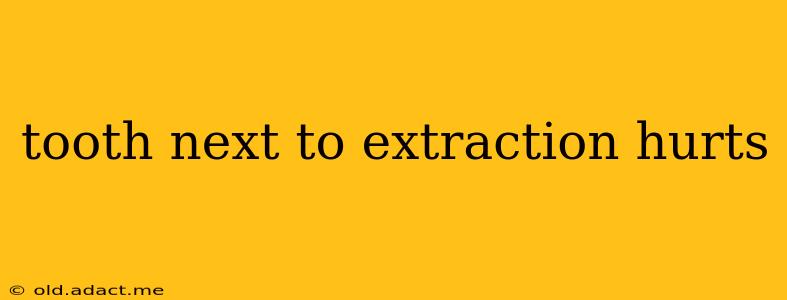Having a tooth extracted can be a significant experience, and it's perfectly normal to experience some discomfort afterward. However, if the tooth next to the extraction site is hurting, it warrants attention. This pain isn't just leftover from the extraction itself; it often signals a separate issue requiring professional care. Let's explore the common causes and what you should do.
Why Does the Tooth Next to My Extraction Hurt?
Several factors can contribute to pain in the tooth adjacent to a recent extraction. Understanding these potential causes can help you communicate effectively with your dentist and receive appropriate treatment.
-
Irritation: The extraction process can sometimes irritate the neighboring teeth. This irritation, while usually temporary, can manifest as sensitivity and mild pain. The gum tissue surrounding the adjacent tooth may also be swollen or inflamed.
-
Dry Socket: While this affects the extraction socket itself, the pain can sometimes radiate to neighboring teeth. Dry socket, or alveolar osteitis, occurs when the blood clot protecting the bone fails to form properly or dislodges prematurely. This exposes the bone, leading to significant pain. This is usually a sharp, throbbing pain.
-
Infection: Bacterial infection is a serious concern after any oral surgery. An infection can spread from the extraction site to nearby teeth, causing pain, swelling, and potentially fever.
-
Existing Dental Issues: The pain might be unrelated to the extraction and instead stem from a pre-existing problem with the adjacent tooth, such as a cavity, cracked tooth, or gum disease (periodontitis). The extraction might have simply exacerbated a pre-existing condition.
-
Referred Pain: Pain can sometimes be referred—meaning it's felt in a different location than its origin. Pain from the extraction site itself might be felt more intensely in the neighboring tooth.
How Long Should Pain Near an Extraction Last?
Mild discomfort and sensitivity in the teeth near the extraction site are expected for a few days. However, if the pain:
- Is severe or worsening: This is a red flag and requires immediate professional attention.
- Is accompanied by swelling, fever, or redness: These are signs of potential infection.
- Persists for more than a week: Prolonged pain warrants a follow-up visit with your dentist.
What to Do If the Tooth Next to My Extraction Hurts
Don't hesitate to contact your dentist or oral surgeon immediately if you experience significant or persistent pain in the tooth next to your extraction. They can properly diagnose the cause and provide the necessary treatment. This might include:
- Pain medication: Over-the-counter pain relievers like ibuprofen or acetaminophen can offer temporary relief, but they are not a substitute for professional care.
- Antibiotics: If an infection is suspected, your dentist may prescribe antibiotics.
- Irrigation or debridement: To clean out the extraction site and remove any debris.
- Further treatment of the adjacent tooth: If an underlying dental issue is identified, your dentist will address that concern.
Is it Normal for the Tooth Next to an Extraction to be Sore?
A degree of soreness is common, particularly in the immediate aftermath of the extraction. However, severe, persistent, or worsening pain is not normal and requires a dental professional's assessment.
Can a Tooth Next to an Extraction Fall Out?
While unlikely, it's possible for a weakened tooth adjacent to an extraction to become loose and eventually fall out. This is typically due to pre-existing issues or trauma during the extraction procedure.
When Should I See a Dentist After a Tooth Extraction?
Contact your dentist immediately if you experience any severe or unusual pain, swelling, bleeding, or signs of infection after a tooth extraction. This is crucial for preventing complications and ensuring proper healing. Follow your dentist's post-operative instructions carefully.
Remember, this information is for general knowledge and does not substitute for professional dental advice. Always consult your dentist or oral surgeon for any concerns regarding your oral health.
